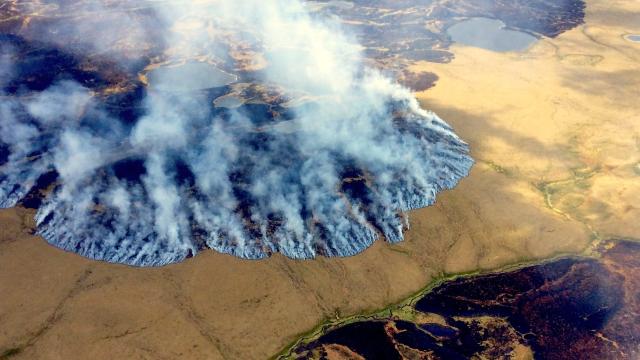It’s not just the Alaskan landscape that’s on fire right now. The state’s university system could also go up in smoke if the Governor Mike Dunleavy’s proposed budget cuts go through. That includes crucial research into how the U.S. Arctic is shifting as temperatures rapidly rise.
Last week, Dunleavy took a red pen to a budget passed by the legislature – one which already included cuts to programs across the state – and lopped an additional $US444 ($635) million off the state’s annual operating budget.
That includes wiping out $US135 ($193) million of funding to the state university system ($US5 ($7) million of which was approved by the legislature), a draconian cut of 41 per cent of its state funding for the 16 university campuses.
On Saturday, University of Alaska President Jim Johnsen wrote a letter to the university community calling the proposed cuts “devastating news” that “will strike an institutional and reputational blow from which we may likely never recover.”
According to the letter, Johnsen is already beginning to take steps that includes furloughing employees and finding other areas to cut corners, and if the cuts go into effect, going through the “unprecedented process” of letting go of tenured faculty. A veto-proof majority of the legislature would be needed to override Dunleavy’s cuts and it’s not clear the Republican-controlled legislature has the votes to do that.
The university provides all sorts of services, like remote campuses, that serve the state’s rural population and assist the federal agencies monitoring Alaska’s active volcanoes and the violent earthquakes that occasionally shake the region and can unleash tsunami waves that rip across the Pacific.
It’s also a major hub for climate research in the changing Arctic and what it means for ecosystems, livelihoods, health, and more. In emails to Gizmodo, researchers called the system “essential” and “the backbone” of Arctic research in the United States.
Rick Thoman, a climate researcher at the university-headquartered Alaska Center for Climate Assessment and Policy, told Gizmodo that the system is the “primary academic centre in the United States doing Arctic research, not just physical/biological sciences but social science on the needs of the peoples of Alaska. No other institution in Alaska can do this work.” (He also noted his views do not represent those of his employer.)
Indeed, the science done at these institutions is of critical use within the state where the problems climate change poses are extraordinary.
Communities are being washed into the ocean and upended by permafrost thawing.
They’re facing an increasing risk of traditional livelihoods and ways of life. Without a dedicated home, research on these subjects will fragment or cease to exist, leaving Alaskans in the dark about the threats of climate change and science-based solutions. And the loss of research would ripple through the entire U.S. Arctic research community.
“There is an idiom in the North – what happens in the Arctic doesn’t stay in the Arctic,” Victoria Herrmann, the president of the Arctic Institute think tank, told Gizmodo. “Every climate change researcher, educator, scientist, and student in the Lower 48 whose work touches the American Arctic relies on the University of Alaska. If the UA is defunded at the current rate, Arctic research in every corner of America will suffer.”
That also extends to other Arctic nations where similar rapid changes are taking place. Henry Huntington, a consultant who does work in the region, told Earther that the university-based International Arctic Research Center (IARC) is “among the world’s premier Arctic science institutes, with an unusual breadth of disciplines and ability to conduct interdisciplinary research.” Splintering a research effort like that apart would break up the daily connections forged by researchers there and across the global network of scientists studying the Arctic.
Aside from dealing a devastating blow to the research community, the cuts could also threaten the very essence of what’s needed to do said research: data. The university is responsible, in part, for maintaining a four sites that are part of Long Term Ecological Research program run by the federal government.
Those sites provide a continuous look at key pieces of the Arctic ecosystem and the impacts of climate change, including changes to fire season, the disappearance of sea ice, and changes to the base of the ocean food chain that could impact the state’s fisheries. Any interruption or downgrade in monitoring at those sites would hamper our understanding of the changes gripping the region.
Even beyond those sites, Herrmann warned that “across the board we will lose vital data” because the university maintains so many other programs monitoring species migration, permafrost depth, and subsistence resources crucial for Alaska Native communities.
Thoman also warned the university’s century-old experimental farm located 40 minutes outside Anchorage (yes, Alaska has an experimental farm) could “simply cease to exist” at a time when rising temperatures could make certain crops more enticing to grow in the state
All of this doubles back onto the daily lives of Alaskans and millions of people living across the Arctic. Ironically, Dunleavy chose to cut the research budget so that Alaskans could keep getting money paid out of the state’s Permanent Fund of oil and gas revenue every year.
That fossil fuel extraction is speeding along the very climate change impacts the state may no longer be able to monitor or plan for if the legislature doesn’t overrule Dunleavy’s cuts. And no amount of money paid out of the Permanent Fund will be enough to make up for the risks that the American state could face if it decides to fly blindly into an ever-changing future.
